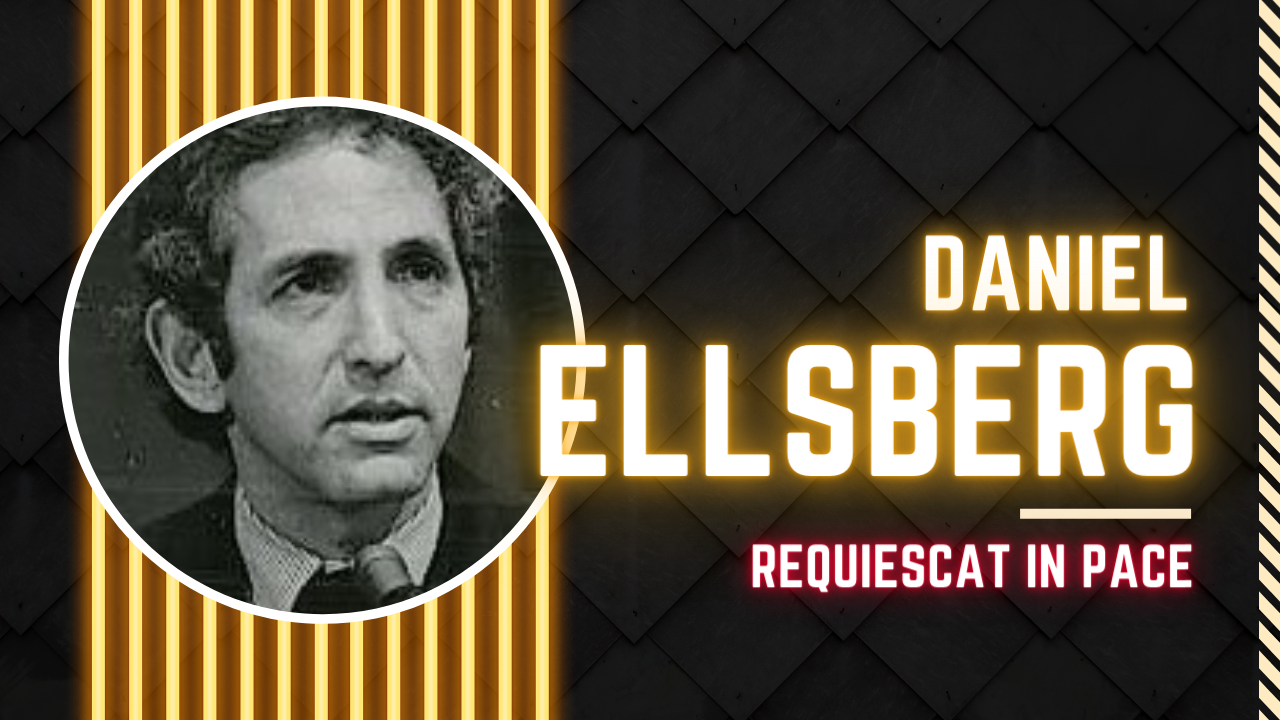Executive
Daniel Ellsberg, R.I.P.
Daniel Ellsberg, RAND Corporation analyst and leaker of The Pentagon Papers, died Friday at his home. He was 92 years old.

Daniel Ellsberg, best known as the Man Who Leaked the Pentagon Papers, died yesterday morning at his home. He was 92 years old.
Daniel Ellsberg and his times
Reportage on the death of Daniel Ellsberg came, naturally, from The New York Times, who broke the story. Other reports come from John Solomon’s Just the News and The Daily Caller.
Daniel Ellsberg had, in March, received a diagnosis of inoperable pancreatic cancer. In a sorrowful tweet and email, he announced that he had but six months to live.
People remember little of his motive – to reveal what was really happening in Vietnam, and the systematic lies and dissemblances that kep from the American public some ugly facts. Chief among them:
- American forces were supporting a side that had little to recommend it other than “not being Communist,” and
- American forces were losing the war and indeed could never win.
That last is still the subject of hot debate. Regardless, Ellsberg and his colleague, Anthony Russo, secretly photocopied 7,000 pages of documents and forward these to The New York Times and The Washington Post. For that, they faced charges of espionage, theft, and conspiracy – charges a court dismissed in 1973 on the basis that the government had committed its own misconduct. (That misconduct included a break-in and bugging of the office of Ellsberg’s former psychiatrist and an attempt to bribe the judge with the Directorship of the Federal Bureau of Investigation. J. Edgar Hoover, the first Director, died in 1972.)
In yesterday’s obituary, Robert D. McFadden wrote “successive Presidents … exceeded their authority, bypassed Congress and misled the American people.”
The Pentagon Papers case
But people don’t remember the case of U.S. v. Daniel Ellsberg and Anthony Russo. Instead they remember the case of U.S. v. The New York Times and The Washington Post, 403 U.S. 713 (1971). In it a unanimous Supreme Court held that the First Amendment trumped any consideration of national security, as regards documents already in the hands of the news organs involved. “Prior restraint” was never justifiable.
Daniel Ellsberg apparently never once supported a single military adventure of the United States from Vietnam onwards. He opposed the invasions of Afghanistan and Iraq after the Attacks of September 11, 2001. In April, according to The Hill, Ellsberg said the Russia-Ukraine war looked to him like a Vietnam-like stalemate. The Nation quoted him as warning of nuclear conflict arising from that conflict. He also said that, no matter what Putin has done (and he criticized Putin scathingly), it was no worse than what the U.S. and many European countries had done before.
Terry A. Hurlbut has been a student of politics, philosophy, and science for more than 35 years. He is a graduate of Yale College and has served as a physician-level laboratory administrator in a 250-bed community hospital. He also is a serious student of the Bible, is conversant in its two primary original languages, and has followed the creation-science movement closely since 1993.
-

 Civilization3 days ago
Civilization3 days agoWhy Europe Shouldn’t Be Upset at Trump’s Venezuelan Actions
-

 Executive4 days ago
Executive4 days agoHow Relaxed COVID-Era Rules Fueled Minnesota’s Biggest Scam
-

 Christianity Today3 days ago
Christianity Today3 days agoSurprising Revival: Gen Z Men & Highly Educated Lead Return to Religion
-

 Civilization4 days ago
Civilization4 days agoThe End of Purple States and Competitive Districts
-

 Executive4 days ago
Executive4 days agoWaste of the Day: Can You Hear Me Now?
-

 Executive5 days ago
Executive5 days agoWaste of the Day: States Spent Welfare in “Crazy Ways”
-

 Civilization1 day ago
Civilization1 day agoWhy Europe’s Institutional Status Quo is Now a Security Risk
-

 Civilization2 days ago
Civilization2 days agoDeporting Censorship: US Targets UK Government Ally Over Free Speech












